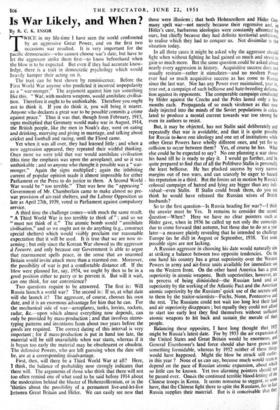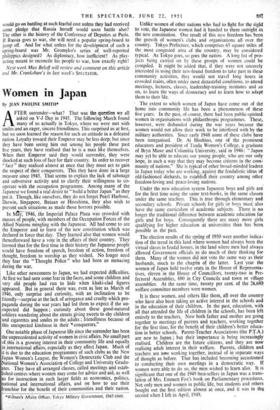Is War Likely, and When?
By R. C. K. ENSOR TWICE in my life-time I have seen the world confronted by an aggressive Great Power, and on the first two occasions war resulted. It is very important for the pacific democracies—who cannot choose war's date, but have to let the aggressor strike them first—to know beforehand when the blow is to be expected. But even if they had accurate know- ledge, there is a trait in democratic psychology which would heavily hamper their acting on it.
The trait can be best shown by reminiscence. Before the First World War anyone who predicted it incurred unpopularity as a " war-monger." The argument against him ran something like this. " War, with modern weapons, would annihilate civilisa- tion. Therefore it ought to be unthinkable. Therefore you ought not to think it. If you do think it, you will bring it nearer. Anyone who declares a great war to be possible commits a crime against peace." Thus it was that, though from February. 1913, signs multiplied that Germany would make war in August, 1914. the British people, like the men in Noah's day, went on eating and drinking, marrying and giving in marriage. and talking about cricket and football and racing, until the Flood came.
Yet when it was all over, they had learned little ; and when a new aggression appeared, they repeated their wishful thinking. Once more we were told that war would annihilate civilisation (this time the emphasis was upon the aeroplane), and so it was unthinkable : and so anyone who thought it possible was a " war- monger." Again the signs multiplied; again the inhibiting current of popular opinion made it almost impossible for either Parliament or the Press to do justice to them. A Second World War would be " too terrible." That was how the " appeasing " Government of Mr. Chamberlain came to make almost no pre- war provision of air-raid shelters, and the Labour Opposition so late as April 27th, 1939, voted in Parliament against compulsory service.
A third time the challenge comes—with much the same result. " A Third World War is too terrible to think of " ; and so we " must not think of it." The atomic bomb would " annihilate civilisation," and so we ought not to do anything (e.g., construct special shelters) which would visibly proclaim our reasonable expectation that it will be used. It is true that we are now re- arming ; but only since the Korean War showed us the aggressor d roeuvre, and only because our Government is able to argue that rearmament spells peace, in the sense that an unarmed Britain would invite attack more than a rearmed one. Moreover, the possibility of war is put a comfortable distance off. If the blow were planned for, say, 1954. we ought by then to be in a good position either to parry or to prevent it. But will it wait, can one think, for our convenience?
Two questions require to be answered. The first is: Will Russia launch a world war? The second is: If so, at what date will she launch it? The aggressor, of course, chooses his own date, and it is an enormous advantage for him that he can. For the mechanical side of war—aeroplanes, tanks, lorries, rockets, radar, &c.—upon which almost everything now depends, can only be provided by mass-production ; and that involves stereo- typing patterns and inventions from about two years before the goods 'are required. The correct dating of this interval is very important ; for if mass-production is put in hand too late, the material will be still unavailable when war starts, whereas if it is begun too early the material may be obsolescent or obsolete. The defensive Powers, who are left guessing when the date will be, are at a corresponding disadvantage.
First, then, will there be a Third World War at all? Here, 1 think, the balance of probability now strongly indicates that there will. The arguments of those who think that there will not too often remind one of what used to be said before 1914 about the moderation behind the bluster of Hohenzollernism, or in the 'thirties about the possibility of a permanent live-and-let-live between Great Britain and Hitler. We can easily see now that those were illusions ; that both Hohenzollern and Hitler Ger. many spelt war—not merely because their regressive and, in Hitler's case, barbarous ideologies were constantly affronted by ours, but chiefly because they had definite territorial ambitions, to realise which they had to conquer us. Not dissimilar is the situation today.
In all three cases it might be asked why the aggressor should fight when without fighting he had gained so much and stood to gain so much more. But the same question could be asked about nearly every aggression in history. Acquisitive success does not usually restrain—rather it stimulates—and no modern Power ever had so much acquisitive success as has come to Russia since the last war. Nor has any Power ever maintained, year in, year out, a campaign of such bellicose and hate-breeding defama- tion against its opponents. The comparable campaign conducted by Hitler against the Czechs and the Poles lasted only a few months each. Propaganda of so much virulence as that now daily injected into the minds of the Soviet populations is calcu. kited to produce a mental current towards war too strong for even its authors to resist.
But, it may be objected, has not Stalin said deliberately and repeatedly that war is avoidable, and that it is quite possible for Russia to-have one ideology and one set of institutions while other Great Powers have wholly different ones, and yet for no collision to occur between them? Yes, of course he has. What else could he be expected to say? No one planning a war shows his hand till he is ready to play it. I would go further, and be quite prepared to find that of all the Politburo Stalin is personally the least bellicose. He has plucked success by very narrow margins out of two wars, and can scarcely be eager to hazard his reputation in a third. But the forces set in motion by Russia's colossal campaign of hatred and lying are bigger than any indi. vidual—even Stalin. If Stalin could break them, do you not think he would have released the Russian wives of British husbands?
So to the first question—Is Russia heading for war?-1 think the answer must be Yes. It remains to consider the second question—When? Here we have no clear pointers such as Hitler gave, when in 1936 he called up not only the conscripts due to come forward that autumn, bin those due to do so a year later—a measure plainly revealing that he intended to challenge Europe (as he did) in August or September. 1938. Yet sonic possible signs are not lacking. A Russian aggressor in choosing his date would naturally aim at striking a balance between two opposite tendencies. On tbe one hand his country has a great superiority over the Western Powers in army and air-force units available for immediate use on the Western front. On the other hand America has a great superiority in atomic weapons. Both superiorities, however, are in process of being diminished—the Russian land and air superiority by the working of the Atlantic Pact and the American atomic superiority by the Russians' quick use of the secrets sold to them by the traitor-scientists—Fuchs, Nunn, Pontecorvo and the rest. The Russians could not wait too long lest their land and air superiority disappears ; but equally they could not afford to start too early lest they find themselves without sufficient atomic weapons to hit back and sustain the morale of their people. Balancing these opposites, I have long thought that 1952 might be Russia's latest date. For by 1953 the air expansion of the United States and Great Britain would be enormous, and General Eisenhower's land force should also have grown into something formidable, whereas by 1952 neither of these things would have happened. Might the blow be struck still earlier, in this year ? None of us can say, because much would seem lo depend on the pace of Russian atomic expansion, about which so little can be known. Yet two alarming pointers should not be passed over. One.is the continued terrible blood-letting of the Chinese troops in Korea. It seems nonsense to suggest, as song have, that the Chinese fight there to spite the Russians, for in fad Russia supplies their material. But is it conceivable that the! would go on battling at such fearful cost unless they had received some pledge that Russia herself would soon battle also? The other is the history of the Conference of Deputies at Paris. If Russia goes to war, she will need a popular spring-board to jump off. And for what unless for the development of such a spring-board was Mr. Gromyko's series of well-reported philippics designed? As diplomacy, how inefficient! As play- acting meant to reconcile his people to war, how exactly right!
Next week Max Beloff will review and comment on this article and Mr. Crankshaw's in last week's SPECTATOR.



















































 Previous page
Previous page